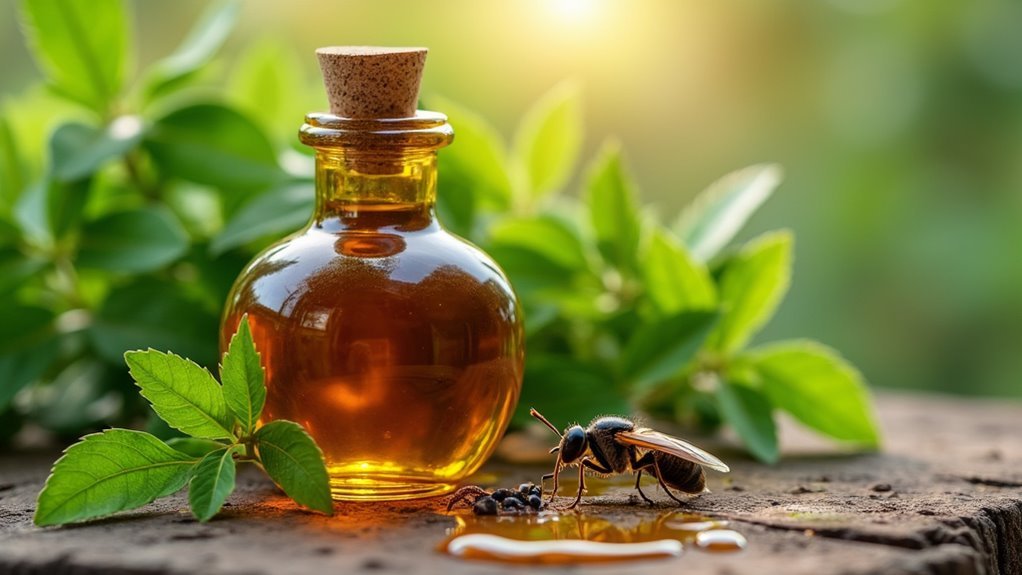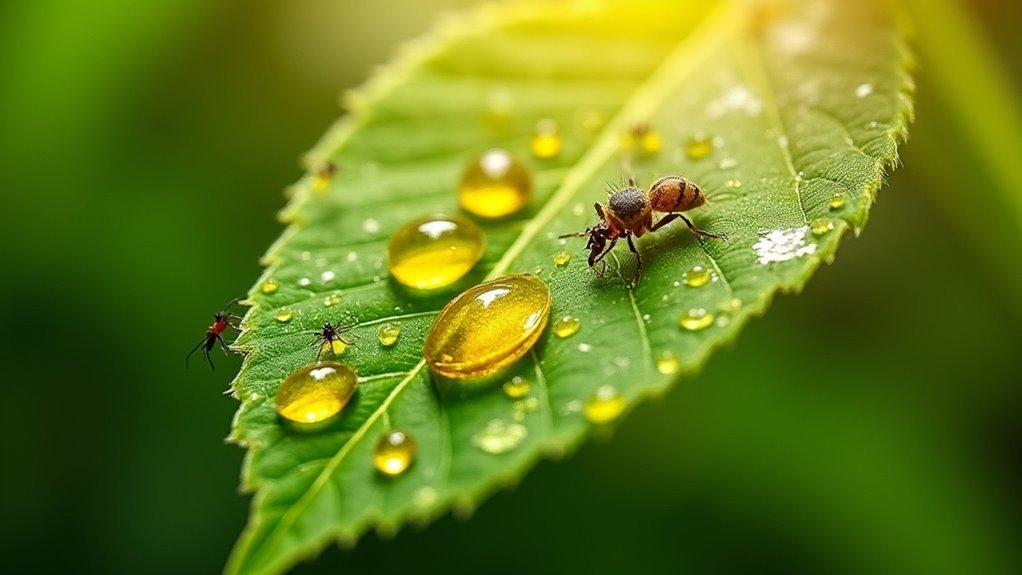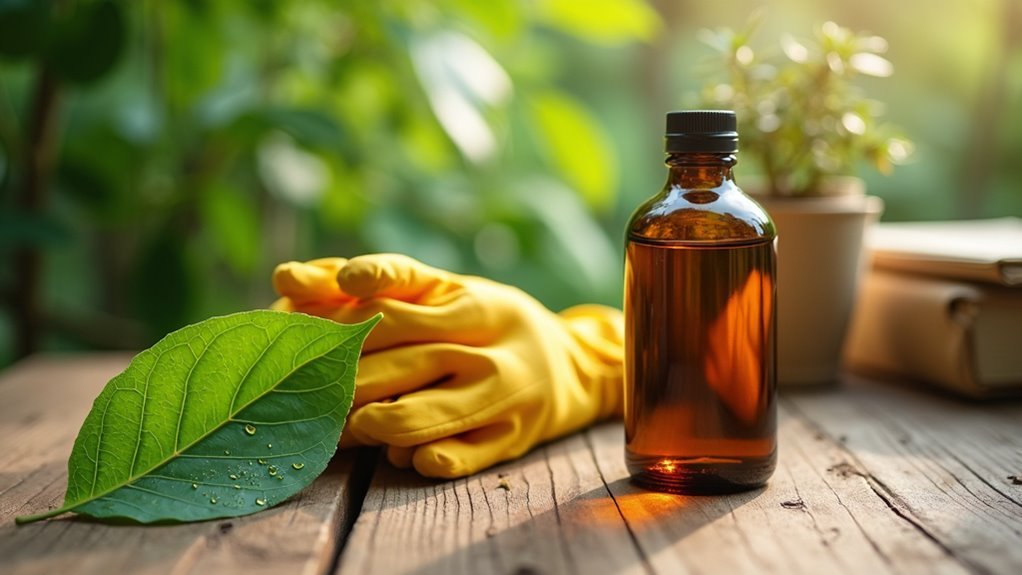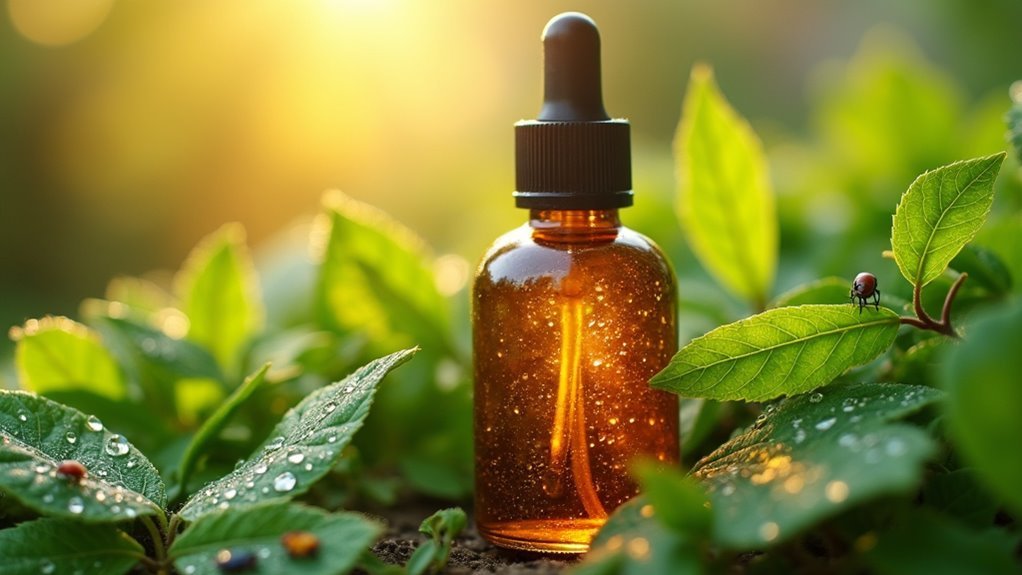You’ll find neem oil concentrate offers powerful, chemical-free protection against garden pests like aphids, spider mites, and whiteflies. Mix 2 tablespoons per gallon of water and apply every 7-14 days, covering leaf undersides thoroughly. The active ingredient Azadirachtin disrupts pest growth and feeding patterns while treating fungal diseases like powdery mildew. Apply during early morning or evening hours when beneficial insects aren’t active. Understanding proper timing and application techniques will maximize your garden’s natural defense system.
Understanding Neem Oil Extract as a Multi-Purpose Pest Control Solution

When you’re searching for an effective, chemical-free solution to protect your garden, neem oil extract stands out as nature’s versatile pest fighter.
This powerful concentrate delivers triple-action protection as an insect control agent, fungicide, and miticide in one application. You’ll appreciate how this organic gardening staple targets troublesome pests like aphids and spider mites while simultaneously combating fungal diseases such as powdery mildew and black spot.
The secret lies in Azadirachtin, neem oil’s active ingredient that disrupts insect growth and feeding patterns across all life stages.
Unlike synthetic chemicals, this natural concentrate works systematically to break pest reproduction cycles. You can confidently use neem oil knowing it won’t harm beneficial insects when applied correctly, making it an ideal choice for sustainable garden management.
Proper Mixing and Application Techniques for Maximum Effectiveness
Getting maximum results from neem oil extract requires proper mixing ratios and application techniques that guarantee even coverage and ideal pest control.
Success with neem oil depends on precise mixing ratios and thorough application methods that ensure complete plant coverage and effective pest management.
For maximum effectiveness when spraying neem oil, follow these essential steps:
- Proper mixing: Combine 2 tablespoons (1 fl oz) of concentrate per gallon of water, shaking well for even solution.
- Complete coverage: Apply to visibly wet all plant surfaces, ensuring you cover all areas including undersides of leaves where pests hide.
- Strategic timing: Spray during early morning or late evening to protect beneficial insects and prevent leaf burn.
- Consistent reapply schedule: Treat plants every 7-14 days depending on pest presence.
- Fresh preparation: Use your neem oil solution within 8 hours for peak potency.
Monitor plants regularly for stress signs and adjust application techniques accordingly.
Target Pests and Diseases Controlled by Neem Oil Concentrate

Because neem oil concentrate targets multiple pest categories simultaneously, you’ll find it effectively controls an impressive range of garden threats that typically require separate treatments. This three-in-one solution works as a fungicide, insecticide, and miticide, making it perfect for organic gardening enthusiasts.
| Pest Category | Specific Threats Controlled |
|---|---|
| Soft-bodied insects | Aphids, mealybugs, whiteflies |
| Spider mites | All developmental stages |
| Fungal diseases | Powdery mildew, black spot |
| Additional fungi | Anthracnose, rust |
| Life cycle control | Eggs through adults |
Neem oil’s active ingredient, Azadirachtin, disrupts pest growth and development across all life stages. You’ll notice powdery mildew control within 24 hours, while other pests succumb gradually as their reproductive cycles become compromised.
Timing and Frequency Guidelines for Optimal Garden Protection
Knowing which pests neem oil controls sets the foundation, but applying it at the right intervals maximizes its protective power in your garden. Proper timing and frequency guarantee effective pest control while preventing resistance buildup.
Follow these application guidelines for best results:
- Early intervention: Apply Neem Oil at first signs of pests or fungal diseases for maximum control effectiveness
- Pest persistence: Reapply every 3-4 days when insects remain actively feeding on treated plants
- Fungal treatment: Mix 2 tablespoons per gallon, following 7-14 day frequency based on disease severity
- Weather timing: Avoid application within 24 hours of expected rainfall to prevent washout
- Dormant spray: Apply during off-season to eliminate overwintering eggs on trees and shrubs
Consistent timing transforms neem oil from reactive treatment into proactive garden protection.
Safety Precautions and Storage Requirements for Neem Oil Products

While neem oil offers effective pest control, you’ll need to handle it with proper safety precautions to protect yourself and the environment.
Always wear protective gear when applying neem oil, as it can cause moderate eye irritation and skin irritation if absorbed. Wash your hands thoroughly after each use to prevent contact with sensitive areas.
Protect yourself with proper gear when applying neem oil to avoid eye and skin irritation.
Follow proper storage requirements by keeping neem oil in its original container, tightly sealed, away from sunlight, food, and feed to maintain effectiveness and prevent contamination.
Dispose of containers according to local disposal guidelines—never pour down drains.
Remember that neem oil is toxic to bees, so avoid application when they’re present and consider environmental factors to prevent water contamination during use.
Frequently Asked Questions
Why Is Neem Oil Banned as a Pesticide?
You’ll find neem oil’s banned because it harms beneficial insects like bees and aquatic organisms. Authorities restrict it when concentrations exceed limits or when misapplication disrupts ecosystems, prompting stricter regulations.
Can You Spray Neem Oil Directly on Vegetables?
You can spray neem oil directly on vegetables safely. Mix two tablespoons per gallon of water, apply during cooler hours, and wash vegetables thoroughly before eating to remove residue.
What Plants Not to Use Neem Oil On?
You shouldn’t use neem oil on delicate plants like ferns, flowering plants during bloom time, young seedlings, stressed plants, or sensitive varieties like orchids and African violets.
Does Rain Wash off Neem Oil?
Yes, rain washes off neem oil from your plants, reducing its pest control effectiveness. You’ll need to reapply after rainfall since the oil gets diluted or removed from plant surfaces completely.
In Summary
You’ve now got the knowledge to harness neem oil’s power against garden pests effectively. Remember to mix it properly, apply it at the right times, and store it safely. Don’t forget that consistency matters – regular applications will give you better results than sporadic treatments. With proper technique and timing, you’ll protect your garden naturally while keeping beneficial insects safe. Start implementing these strategies today for healthier, pest-free plants.





Leave a Reply